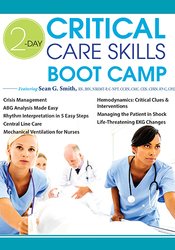Subtotal: $60
Sean G. Smith – 2-Day: Critical Care Skills Boot Camp
$390 Original price was: $390.$111Current price is: $111.
Shopping Instructions:
- DISCOUNT 15% : SHOP15
- Product Delivery: Within 1 – 12 hours after purchase.
Working in the rapidly-changing critical care setting and caring for the most complex patients means you have to be able to recognize these changes and respond appropriately.
Sean G. Smith – 2-Day: Critical Care Skills Boot Camp
You have the daunting challenge of recognizing subtle changes in a patient’s condition that can lead to a medical emergency or worse, a patient’s death. Are you sure you have the knowledge and skills you need to handle these difficult situations?
Working in the rapidly-changing critical care setting and caring for the most complex patients means you have to be able to recognize these changes and respond appropriately. You’re dealing with life-threatening conditions and you need to be up to date on the most current and cutting-edge strategies. Watch this comprehensive program and gain the skills you need to manage any situation. Drawing on over 12 years of critical care experience, Sean G. Smith will challenge you to take your knowledge to the next level!
- Identify 5 essential components of a “down and dirty” assessment in your patient when they have a sudden decomposition in health status.
- State 3 rapid interventions that can stabilize a patient who is symptomatic with a low blood pressure.
- Recognize the most common causes of arterial blood gas abnormalities.
- Assess the 3 most common dysrhythmias using rhythm strip interpretation.
- Evaluate the risk of re-expansion pulmonary edema in the patient with a chest tube for pleural effusion.
- Review the correct technique for opening an occluded central line lumen.
- Summarize the difference between failure to capture and failure to sense in a pacemaker and how each is resolved.
- Recognize the three biggest concerns patients recognize at end of life.
- Discuss the difference between preload, contractility and afterload as components impacting cardiac output.
- Identify correct locations for measuring CVP, Arterial Line and Wedge waveforms.
- Differentiate between hypotonic, isotonic and hypertonic IV fluids and when each is considered most effective.
- Recognize the blood product of choice for Disseminated Intravascular Coagulopathy.
- Contrast the difference between hypovolemic shock, septic shock and cardiovascular shock in both assessment and treatment priorities.
- Prioritize ways to increase the ventilator patient’s oxygenation status.
- Compare and contrast CPAP and BiPAP, as well as their target populations.
- Compare the differences between a STEMI and NSTEMI.
Would you like to receive Sean G. Smith – 2-Day: Critical Care Skills Boot Camp ?
DAY 1
- Identification & Management of Crisis
- Master “Down & Dirty” Assessment Skills
- Impending Doom: Recognizing the “Red Flags”
- Rapid Stabilizing Interventions
- Managing the Decompensating Patient
- Easy Steps to ABG Analysis
- Understanding Acid-Base Imbalance
- Lab Results: Identify the 4 Abnormal Findings
- A Simple Tool to Change Your Practice
- The 5 Steps to Rhythm Strip Interpretation
- Systematically Review Rhythm
- Identifying Critical Changes
- Effective Management of:
- Atrial Fibrillation
- Atrial Flutter
- PSVT
- V-Tach
- V-Fib
- Managing Chest Drainage
- Indications for Chest Tubes
- Circumventing Re-expansion Pulmonary Edema
- Avoiding Common Complications
- Master Central Line Care
- Common Complications & Solutions
- When to Use Which Port & Why
- Is a “Cell-Saver” an Option for your Patient?
- The Challenges of CVP Monitoring
- Pacemakers & AICDs
- Indications for Pacemakers
- Understanding Pacemaker Codes
- Types of Pacemakers
- Device Management
- Practical Solutions to Common Problems
- End-of-Life Care in the ICU
- Practical Tips to Help Your Patients & Families
- Your Role as the Patient Advocate
- Tips for Addressing Difficult Conversations
DAY 2
- Respiratory Emergencies: Understanding Hemodynamics Today
- Cardiac Output = Heart Rate x Stroke Volume
- A Simple Analogy Guaranteed to Help You “Get It”
- Preload, Afterload and Contractility
- Manipulating the Math Equation to Stabilize
- The ICU Trio in Crisis!
- IV Fluids – The Right One for the Situation
- 5 pressor Agents – Their Action & Use
- Blood Products! FFP, Platelets, PRBCs & Cryoprecipitate
- Demystify Hemodynamic Waveforms
- Correct Measurement
- Assessment Clues to Instability
- Central Venous Pressures
- Arterial Lines
- Swan Ganz Catheters
- Mechanical Ventilation for Nurses
- Managing the Patient on a Ventilator
- Avoiding Ventilator Acquired Pneumonia
- Using CPAP or BiPAP
- Manage Shock
- Assessment and Management of:
- Cardiogenic Shock
- Septic Shock
- Hypovolemic Shock
- Assessment and Management of:
- Manage the Neuro Patient
- Using an Easy “5-point Neuro Check”
- Stroke and Stabilization
- Ischemic
- Hemorrhagic
- Delirium
- How to Assess & When to Intervene
- Life-threatening EKG Changes
- Clues from the 12-Lead
- Spectrum of Coronary Artery Ischemia
- 5-step Method for Identifying Ischemia & Injury
- STEMI and NSTEMI – What’s the difference?
- Location, Location, Location
Related products
NLP & Hypnosis
NLP & Hypnosis
NLP & Hypnosis
NLP & Hypnosis
NLP & Hypnosis
NLP & Hypnosis
NLP & Hypnosis
NLP & Hypnosis

 Scott Haines – Shortcut Copywriting Course
Scott Haines – Shortcut Copywriting Course  Ichimokutrade – Heiken Ashi 101
Ichimokutrade – Heiken Ashi 101 










